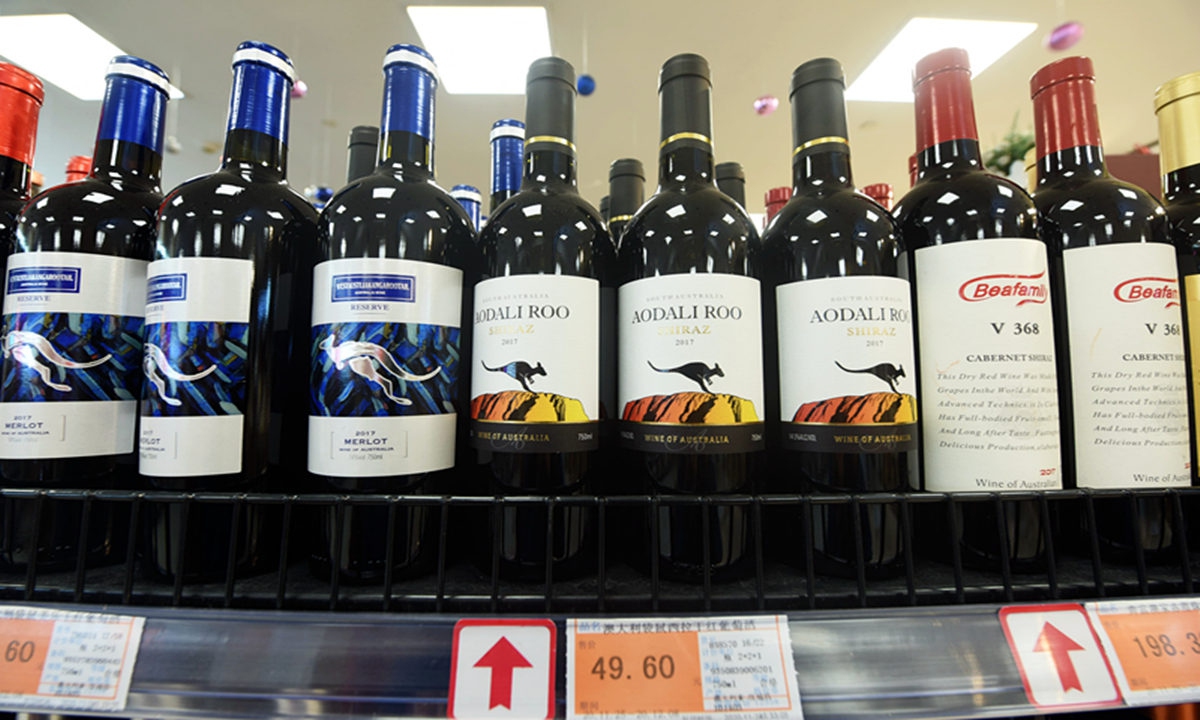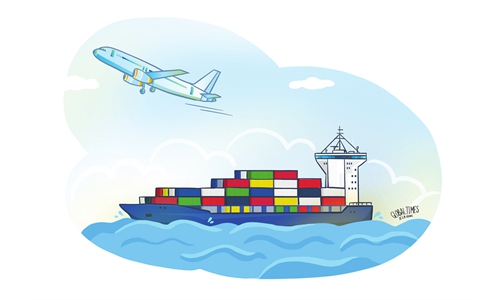
Bottles of Australian wine on the shelf of a supermarket in Hangzhou, East China's Zhejiang Province on November 27, 2020 Photo: VCG
Australian wine producers are optimistic about the China market as they bolster their expansion, as the just-ended successful visit of Chinese Premier Li Qiang to Australia injected more impetus and certainty into the thawing bilateral economic ties.
Major Australian wine producer Treasury Wine Estates (TWE) on Thursday shared a market update with the Global Times on its Penfolds business and the company's China strategy, almost three months after China's removal of tariffs on Australian wine imports.
TWE CEO Tim Ford said in the market update that it was fantastic to see local Chinese consumers reignite their passion for Penfolds Australian luxury wines, noting "a sense of renewed market momentum now that the Chinese market has reopened."
"We are delighted to bringing more of our Australian luxury wines back to China, at a time when the luxury wine market presents significant long-term growth opportunities for Penfolds and the wine category overall," Ford said, and the company aims to be the No.1 luxury wine brand in the China market.
The company revealed the delivery of a record Australian vintage in 2024. This development is expected to significantly increase the availability of Penfolds Bin and Icon wines starting from the latter half of 2026, according to the company.
For fiscal 2025, Penfolds expects its earnings before interest and taxes to further improve to 43-45 percent, with the China market playing a positive role.
"Similar to the roadmap we have followed in France, we continue to explore further winemaking opportunities in China, including investing in local sourcing and production opportunities to support future portfolio growth opportunities," said Tom King, Penfolds managing director.
In a recent interview with the Global Times, King said that the company is optimistic about its business in China, noting that "our commitment to China has only grown stronger with the release of our first China-made Penfolds wines."
Other major Australian wine producers - including the country's second-largest wine group Accolade Wines - also have positive expectations for business in China.
In a statement given by Accolade Wines CEO Robert Foye on March 29, right after China's tariffs were lifted on Australian wine, he said that "While we do not anticipate a snapback to 2020 levels, we do see a sizeable opportunity for our business in China and we are excited about the long-term potential this market brings."
In just one month after the duties were removed on bottled wine, Australia exported more than $86 million worth of quality wine to China, according to joint article by Don Farrell, the Australian trade minister, and Murray Watt, the minister for agriculture, fisheries and forestry, on June 12.
"This is a great outcome for our wine producers, after three years of trade disruptions, along with natural disasters and global reductions in demand," the article said.
Chinese consumers have become the largest consumer group of world-class wines, according to the 2024 Hurun China Wineries TOP 50.
China-Australia trade has taken on a faster pace of recovery since last year, with major goods such as coal, barley, wine and cotton having gradually recovered amid improved relations. Recently, Australian beef sales to China showed signs of recovery.
The recent high-level visit by the Chinese premier added even more certainty to the bilateral economic and trade ties.
Speaking about the high-level visit as well as the future of bilateral ties, the spokesperson of the Ministry of Commerce He Yadong said at a regular press conference on Thursday that the highly complementary nature of the economies of China and Australia makes them natural partners.
China is willing to work together with Australia to make good use of mechanisms such as the Joint Ministerial Economic Commission and the China-Australia Free Trade Agreement Joint Committee; continuously expand bilateral trade and investment; consolidate cooperation in traditional advantageous industries, and actively explore cooperation in green development, the digital economy, and other areas to promote the stable and healthy development of bilateral economic and trade relations, the spokesperson said.



